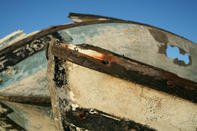Benguela Current
Born into deprivation, the West Coast fishers feel trapped on the economic fringe by unfair fishing rights allocations. Now they face a more enduring problem. Not only is this abundant fishery tangibly over-exploited, but the ocean current which brings the abundance may be altering subtly.

The Benguela Current is a cold body of water that moves up the western coastline of southern Africa. It sweeps past Cape Town, Lambert's Bay, Namibia and the Angolan coast, its frigid temperature scouring the air of moisture and seeding Namibia's desert.
Here, the prevailing southerly winds of summer below the Atlantic's surface water, which has been warmed by the sun, away from the coastline, forcing cooler water from the ocean's depths to take its place.
This upwelling brings with it the accumulated nutrients from the seafloor. The cold, nutrient-loaded water rushes to the surface where bathed in sunlight, it provides food for massive blooms of marine algae, the ocean's pastures.
Zooplankton - microscopic plant-eaters - then graze the algae; fish eat the plankton, birds and mammals eat the fish. It's an entire food chain that is driven by the washing machine action of ocean current and wind and it brings food to the hooks of the fishers. Shifting climatic trends could potentially disrupt both line fishing and lobster catches here.
Thermometers have already captured a 1°C rise in sea surface temperatures around the coast since the 1940s and wind speeds are up an average of about one to three kilometres per hour.
There is considerable debate around whether or not dwindling fisheries of the West Coast are due to chronic over-extraction of fish - 18 line fish species have collapsed due to over-harvesting, according to the State of the Environment Report, while another four are regarded as overexploited.
Or rising temperatures could be pushing them south and east, much like the quiver tree is shifting; or it could simply be a natural and little-understood cycle.
 The Benguela Current is a cold body of water which moves up the western coastline of southern Africa and brings with it one of the richest f...
The Benguela Current is a cold body of water which moves up the western coastline of southern Africa and brings with it one of the richest f... As far as ocean life is concerned, it all starts with the phytoplankton – the plant equivalent of these microscopic floating organisms –...
As far as ocean life is concerned, it all starts with the phytoplankton – the plant equivalent of these microscopic floating organisms –... There is considerable debate about what really underlies the dwindling fisheries of the West Coast of South Africa...
There is considerable debate about what really underlies the dwindling fisheries of the West Coast of South Africa... Things are changing in the Benguela system. Just as one group of scientists noticed that average temperatures have been rising over the Sout...
Things are changing in the Benguela system. Just as one group of scientists noticed that average temperatures have been rising over the Sout... Take the easterly - it sweeps across the Karoo, traverses the Cape mountains, creeps up behind that wispy filament of sand which divides con...
Take the easterly - it sweeps across the Karoo, traverses the Cape mountains, creeps up behind that wispy filament of sand which divides con...